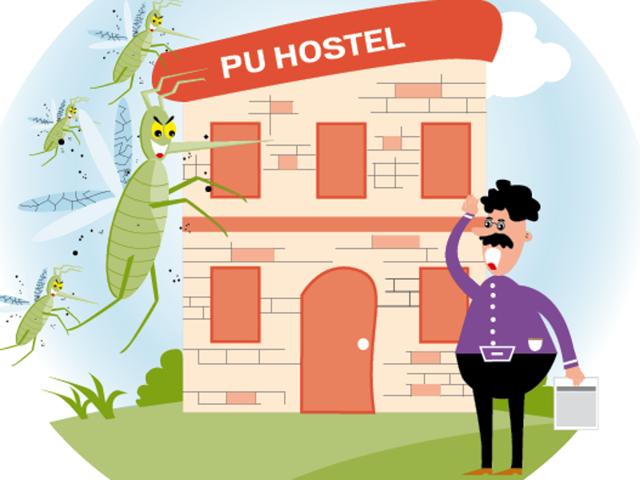15 PU hostels fined for mosquito larvae in cooler water
As monsoon arrived in the city, 15 hostels of Panjab University (PU) were challaned Rs 500 each for mosquito breeding in air coolers, pots, drums and water tanks, on Saturday.
As monsoon arrived in the city, 15 hostels of Panjab University (PU) were challaned Rs 500 each for mosquito breeding in air coolers, pots, drums and water tanks, on Saturday.

The issue of ill-maintained water tanks and air coolers came to light when the medical surveillance wing of health department, Chandigarh along with chief medical officer Dr Dhawan of BGJ Institute of Health, PU visited all 18 hostels.
During the inspection, drinking water in the coolers was found to be contaminated. Larvae were found in most of the air coolers and water tanks in the hostels. The department has conducted surprise inspections in six sectors to check prevalence of conditions in which mosquitoes can thrive.
“Residents in other sectors regularly clean their water tanks and coolers. They avoid water accumulation and stagnation. But in PU, we found larvae in broken chairs, upper caps of washing machines, flower pots, water coolers, water tanks on the roofs and even in the hostel rooms,” said an official of the health department.
He added, “Even after warnings given last week, none of the hostel took any precautionary measure. The 5 hostels which were challaned last week were still found violating the norms, and were issued notices again.”
“Water in one of the tanks which was found to be contaminated was not in use and in a construction work area. We have 14 drinking water tanks, which we get cleaned every week. There is a private company as well, which cleans the tanks scientifically,” said Simrat Kahlon, warden at girls hostel number 7 (Bebe Nanaki Hall).
Dean student welfare (Women) Nandita Shukla said, “Cleaning of the air coolers and water tanks is a regular exercise in the hostels. Our wardens take care of it.”
However the chief medical officer (CMO) of PU Dr Devinder Dhawan said, “We have asked the authorities concerned and the vice chancellor to take required action as soon as possible. Letting mosquitoes breed in these water tanks, is playing with students’ lives.”
On June 21, the anti-malaria officer-cum-challaning officer of Chandigarh administration wrote to the PU registrar Col GS Chadha (Retd) stating that the varsity, especially in its hostels, provided conducive conditions for mosquito breeding.
“This is not in accordance with the provisions under epidemic disease act and Chandigarh prevention and control dengue, malaria programme. Taking a serious note of this, you are required to take immediate and necessary steps in the interest of community and safe guard precious life of the students and officials of PU,” read the letter.
The letter added, “You are required to send the compliance report within Secen days from the receipt of this letter. Failure to do so will attract penalty in accordance with the law.”
The compliance report sent last week stated that all the hostels were found violating the norms; larvae were found in the water tanks and as many as five hostels were challaned.





